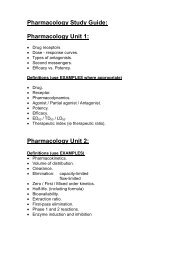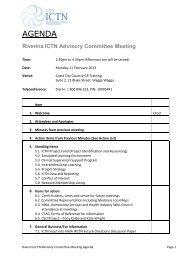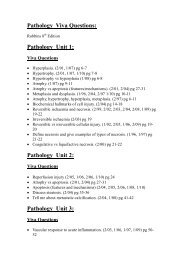Network principles for prevocational medical training - HETI
Network principles for prevocational medical training - HETI
Network principles for prevocational medical training - HETI
Create successful ePaper yourself
Turn your PDF publications into a flip-book with our unique Google optimized e-Paper software.
General practice <strong>training</strong> terms<br />
At a time when trainee numbers are increasing, the extra <strong>training</strong> capacity provided by general<br />
practice placements is a welcome addition to the <strong>prevocational</strong> <strong>training</strong> program. General practice<br />
<strong>training</strong> terms are valued highly by participating trainees, providing wide and varied experiences in<br />
primary health care in a supportive learning environment.<br />
Most general practices take a single trainee at a time, and it is highly disruptive to the practice if<br />
the allocated trainee position is not filled continuously from term to term. It is important that this<br />
is acknowledged in the work<strong>for</strong>ce planning of the network. In general, pulling a trainee out of a<br />
general practice placement should not be considered an appropriate option <strong>for</strong> filling an unexpected<br />
work<strong>for</strong>ce shortage in a hospital. General practices that cannot get <strong>prevocational</strong> trainees on a<br />
regular basis are likely to pull out of the <strong>prevocational</strong> program altogether.<br />
Prevocational general practice placements are organised through general practice regional <strong>training</strong><br />
providers (the same organisations that manage general practice vocational <strong>training</strong>). Each regional<br />
<strong>training</strong> provider appoints a GP DPET who oversees the <strong>prevocational</strong> trainees who are in general<br />
practice placements managed by that organisation.<br />
It is a good idea <strong>for</strong> networks to provide regular opportunities <strong>for</strong> GP and hospital-based DPETs,<br />
JMO Managers and others involved in <strong>prevocational</strong> <strong>training</strong> to meet and get to know each other.<br />
Managing trainees in difficulty<br />
If a trainee is having difficulty meeting per<strong>for</strong>mance requirements, within a single <strong>training</strong> term, this<br />
may be managed by the term supervisor in consultation with the Director of Prevocational Education<br />
and Training <strong>for</strong> that <strong>training</strong> site. The Trainee in difficulty handbook gives detailed guidance about<br />
how to manage the range of problems that may arise. Most difficulties will be temporary and can be<br />
remediated fairly quickly with active management.<br />
If the trainee’s difficulties are likely to continue across more than one term and on rotation to other<br />
<strong>training</strong> sites, the situation should be discussed between the responsible DPETs as soon as<br />
possible and reviewed at the next network committee meeting.<br />
Discussions of individual trainees are conducted in a closed session without the presence of<br />
trainees or guests. Considerations of safety and quality of patient care must have top priority,<br />
followed by the objective of giving the trainee every reasonable opportunity and assistance to<br />
remediate his or her per<strong>for</strong>mance.<br />
Many strategies can be employed to help a trainee who has serious per<strong>for</strong>mance deficiencies:<br />
• z Providing a mentor.<br />
• z Providing extra learning opportunities.<br />
• z Providing psychosocial supports.<br />
• z Referring the trainee to a counsellor, doctor or coach.<br />
• z Allowing a period of extended leave.<br />
• z Giving the trainee a buddy to work with.<br />
• z Making the trainee supernumerary (observing and learning rather than working).<br />
• z Requiring the trainee to repeat the term.<br />
• z Shifting the trainee to a term that is less challenging (with the aim of returning to a higher level<br />
40

















